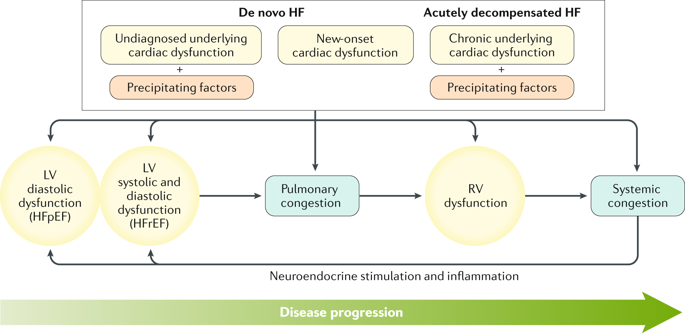当前位置:
X-MOL 学术
›
Nat. Rev. Dis. Primers
›
论文详情
Our official English website, www.x-mol.net, welcomes your
feedback! (Note: you will need to create a separate account there.)
Acute heart failure.
Nature Reviews Disease Primers ( IF 76.9 ) Pub Date : 2020-03-05 , DOI: 10.1038/s41572-020-0151-7 Mattia Arrigo 1 , Mariell Jessup 2 , Wilfried Mullens 3, 4 , Nosheen Reza 2 , Ajay M Shah 5 , Karen Sliwa 6 , Alexandre Mebazaa 7, 8
Nature Reviews Disease Primers ( IF 76.9 ) Pub Date : 2020-03-05 , DOI: 10.1038/s41572-020-0151-7 Mattia Arrigo 1 , Mariell Jessup 2 , Wilfried Mullens 3, 4 , Nosheen Reza 2 , Ajay M Shah 5 , Karen Sliwa 6 , Alexandre Mebazaa 7, 8
Affiliation

|
Acute heart failure (AHF) is a syndrome defined as the new onset (de novo heart failure (HF)) or worsening (acutely decompensated heart failure (ADHF)) of symptoms and signs of HF, mostly related to systemic congestion. In the presence of an underlying structural or functional cardiac dysfunction (whether chronic in ADHF or undiagnosed in de novo HF), one or more precipitating factors can induce AHF, although sometimes de novo HF can result directly from the onset of a new cardiac dysfunction, most frequently an acute coronary syndrome. Despite leading to similar clinical presentations, the underlying cardiac disease and precipitating factors may vary greatly and, therefore, the pathophysiology of AHF is highly heterogeneous. Left ventricular diastolic or systolic dysfunction results in increased preload and afterload, which in turn lead to pulmonary congestion. Fluid retention and redistribution result in systemic congestion, eventually causing organ dysfunction due to hypoperfusion. Current treatment of AHF is mostly symptomatic, centred on decongestive drugs, at best tailored according to the initial haemodynamic status with little regard to the underlying pathophysiological particularities. As a consequence, AHF is still associated with high mortality and hospital readmission rates. There is an unmet need for increased individualization of in-hospital management, including treatments targeting the causative factors, and continuation of treatment after hospital discharge to improve long-term outcomes.
中文翻译:

急性心力衰竭。
急性心力衰竭(AHF)是一种综合征,定义为心力衰竭症状和体征新发(新发心力衰竭(HF))或恶化(急性失代偿性心力衰竭(ADHF)),主要与全身充血有关。在存在潜在的结构性或功能性心功能不全的情况下(无论是慢性 ADHF 还是未确诊的新发心力衰竭),一种或多种诱发因素可诱发 AHF,尽管有时新发心力衰竭可能直接由新的心功能不全的发生引起,最常见的是急性冠状动脉综合征。尽管导致相似的临床表现,但潜在的心脏病和诱发因素可能差异很大,因此,AHF 的病理生理学具有高度异质性。左心室舒张或收缩功能障碍导致前负荷和后负荷增加,进而导致肺充血。液体潴留和重新分布导致全身充血,最终因灌注不足而导致器官功能障碍。目前 AHF 的治疗主要是对症治疗,以减充血药物为中心,最多根据初始血流动力学状态进行调整,很少考虑潜在的病理生理学特殊性。因此,急性心力衰竭仍然与高死亡率和再入院率相关。院内管理的个体化程度尚未得到满足,包括针对致病因素的治疗,以及出院后继续治疗以改善长期结果。
更新日期:2020-03-05
中文翻译:

急性心力衰竭。
急性心力衰竭(AHF)是一种综合征,定义为心力衰竭症状和体征新发(新发心力衰竭(HF))或恶化(急性失代偿性心力衰竭(ADHF)),主要与全身充血有关。在存在潜在的结构性或功能性心功能不全的情况下(无论是慢性 ADHF 还是未确诊的新发心力衰竭),一种或多种诱发因素可诱发 AHF,尽管有时新发心力衰竭可能直接由新的心功能不全的发生引起,最常见的是急性冠状动脉综合征。尽管导致相似的临床表现,但潜在的心脏病和诱发因素可能差异很大,因此,AHF 的病理生理学具有高度异质性。左心室舒张或收缩功能障碍导致前负荷和后负荷增加,进而导致肺充血。液体潴留和重新分布导致全身充血,最终因灌注不足而导致器官功能障碍。目前 AHF 的治疗主要是对症治疗,以减充血药物为中心,最多根据初始血流动力学状态进行调整,很少考虑潜在的病理生理学特殊性。因此,急性心力衰竭仍然与高死亡率和再入院率相关。院内管理的个体化程度尚未得到满足,包括针对致病因素的治疗,以及出院后继续治疗以改善长期结果。































 京公网安备 11010802027423号
京公网安备 11010802027423号